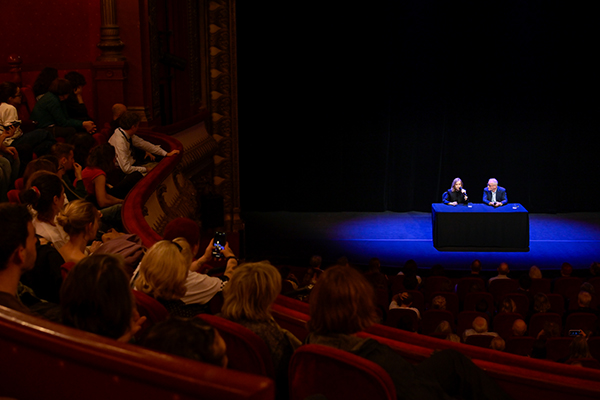A conversation with Isabelle
“I'd have to be called a tragic-comic artist”
PostED ON 19.10.2024
The 2024 Lumière Award laureate Isabelle Huppert spoke to the audience in Lyon during the traditional master class held at the Théâtre des Célestins. She shared some highlights of her career and expressed her vision of cinema.

© Jean-Luc Mège
BEING AN ACTRESS
I already loved cinema before I began performing, but I have to admit that I saw very few films before I became an actress... and incidentally, I haven't seen many more since. I need to come to Lyon more often for cinema therapy! In terms of my profession, I define myself more as an actress than the French synonym of ‘comedienne’, because the latter includes the ‘comedy’ part without the ‘tragedy’ part. In that case, I'd have to be called a ‘tragi-comedienne’, to be more accurate. Cinema is about transmission and dialogue, not only with oneself, but especially with others. Being an actor means being as close to yourself as possible and living your truth, but there's also a certain amount of artifice involved. And in a way, in the characters I play, there's also a part of me that remains. So it's impossible for me to rank the roles I've played, which would have involved varying degrees of difficulty.
READING SCRIPTS
A script is often a thankless job for actors, because it's neither a film nor a book, and it doesn't necessarily tell the story of a film. Sometimes I concentrate solely on the dialogue, or even a single line, which will resonate with me and determine my choice. For example, in Claude Chabrol's Story of Women (1988), my character says: ‘It's not the crane I'm here for, it's the crane driver.’ I thought that line was so well crafted, with so much humour, that it made me want to do the film.
REWATCHING HER FILMS
It's one thing to see the films I've acted in, it's another to see them again. It's a bit of an ordeal to see them for the first time, because in the meantime the editing has been done. On the other hand, it's always interesting to see them again a long time later. There's always a flood of memories that resurface. Yesterday at the festival, for example, I caught a glimpse of Heaven's Gate (1980) by Michael Cimino. Just hearing the music again was so powerful. I remember exactly every moment of the filming, even the weather that day... But not the film itself. It's very strange!
HER ROLES
I get the impression that all the roles are a bit solar. That's what makes them interesting. Even in dark films, you can detect a bit of humour. To take an extreme and unlikely example, The Piano Teacher isn't exactly a comedy, but it's still a bit funny sometimes, because I manage to keep a kind of distance from my role. In the two films I made with François Ozon (8 Women and The Crime is Mine), I played female characters who were a bit hysterical, exaggerated and outrageous, and that was great fun to do. Working with Claire Denis is another, different, situation. I loved making White Material (2009), an extraordinary film that shows the relationship between an individual and the landscape.
A FILM THAT IS CLOSE TO HER HEART
Aloïse by Liliane de Kermadec (1975) is one of the first films I acted in, and very few people know it! I like it a lot. In my opinion, it corresponds to the definition according to which all art is raw. Delphine Seyrig, who plays the lead character (Aloïse Corbaz) as an adult, meant a lot to me, because I played the same character at a younger age. She was a wonderful actress and a wonderful person. We ran into each other briefly, but I didn't see much of her after that. In real life, Aloïse wanted, more than anything, to be an actress, before devoting herself to painting and becoming interned. In the film, her character goes to a theatre for a try-out and says, “I'm not afraid of a big empty stage”. It's a line that really inspired me.
Reported by Fanny Bellocq

